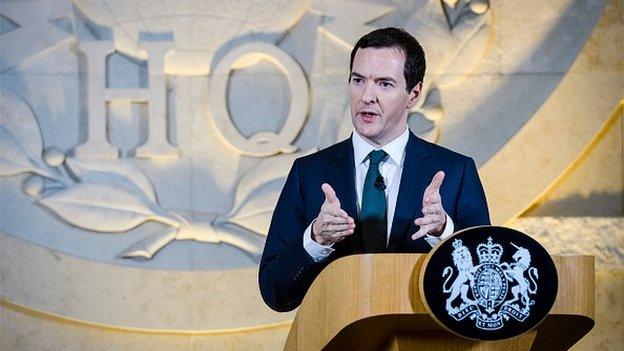How Osborne is bailed out by deflation
- Published
- comments

The weakness and current deflationary bent of the global economy plus the deceleration of UK growth aren't all bad for George Osborne, as he agonises over the finishing touches to what may be his most challenging budget or quasi-budget since taking office more than five years ago.
That may puzzle you given that Friday saw publication of government borrowing figures for October which were confirmation that there is no chance of public sector borrowing falling from just over £90bn last year to a target of just under £70bn in the fiscal year ending next April.
In fact, if public borrowing ends up around £80bn, or around £10bn adrift of the goal, that would not be a great shock, since with five months to go the deficit is less than £7bn below where it was at a comparable stage last year.
And there will also be a mildly embarrassing failure to hit one of the fiscal milestones Osborne loudly promised and swanked about in the last budget - namely debt as a share of GDP seems unlikely to hit its peak this year, which is what the Office for Budget Responsibility had expected.
So where on earth is the wriggle room for George Osborne to respond to the irresistible political and public pressure to soften the impact of his cherished tax-credit cuts, to exact a lesser cull of beat bobbies than had been expected and to strengthen our defences against terrorism?
Extraordinary era
Well he won't shout this but economic disappointment - the failure of the global economy to regain anything like the kind of momentum it had before the Crash of 2008 - delivers something of a cash windfall for him.
It is all to do with the collapse of inflation, the consequential deferral of the first rise in interest rates since the crash of 2008 and the expectation that as and when interest rates rise they will do so only very slowly and in miniscule increments.
This extension of our extraordinary era of almost free money has two benign effects for the Exchequer.
First it means the Treasury will have to shell out less to holders of index-linked gilts, or government debt whose interest payments are protected against the impact of inflation.
Second, the Treasury will receive more income for longer from the Bank of England, on the Bank's £375bn holding of government debt - which it bought in its quantitative-easing monetary rescue programme for the UK after the 2008 crash.
The point is that the Bank of England returns to the Treasury the net interest payments it receives on that £375bn of gilts or government debt - which is the interest payable on the government debt, minus the interest the Bank itself has to pay to finance this quantitative easing investment.
Now that interest rate paid by the Bank of England to borrow is Bank Rate, or the interest rate the Bank sets.
That means if Bank Rate were to go up by 0.25% at the turn of the year - which the Governor of the Bank of England had conditioned us to expect in the summer - that would see borrowing costs for the Bank of England increasing by 0.25% times £375bn, or £937.5m.
And as a consequence the Treasury's income from the Bank would fall by £937.5m per annum.
But no one, including Mark Carney, any longer expects Bank Rate to rise as early as that - because the economy is slowing down and there is no inflation in the system.
Sluggish recovery
In fact many in the City now expect Bank Rate to say at 0.5% for at least another full year.
Anyway, at the risk of labouring this point, each 0.25% rise in Bank Rate cuts Treasury income from the Bank of England by £937.5m.
So the longer interest rates remain where they are, and the less that they rise as and when they rise, the more happy George Osborne will be, in a fiscal sense.
And if the Office for Budget Responsibility believes that as and when Bank Rate settles at a new high in the next five years, that high will be a full percentage point lower than previous expectations, well that would deliver £4bn a year of additional forecast income for Osborne.
In other words, a more sluggish recovery that cuts forecasts of income from taxes is offset to an extent by relatively more interest income round-tripped by the Bank of England to the Chancellor.
None of which is to argue that he is awash with cash.
But he is in less of straitjacket than common sense might suggest he ought to be - especially if he also (as I've mentioned before) changes his 2020 fiscal target from a £10bn surplus to circa a penny.